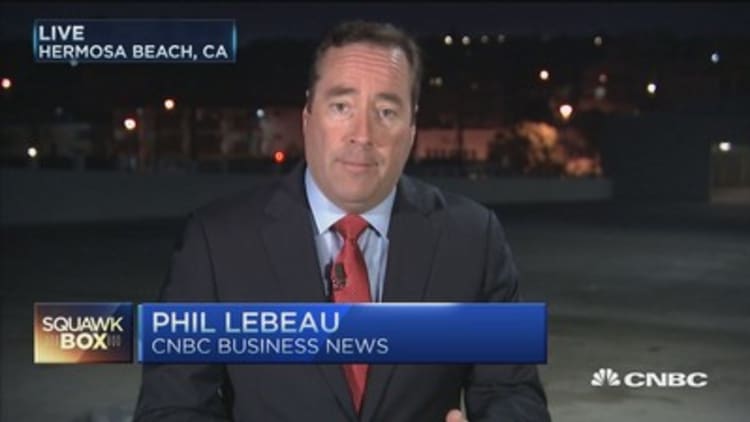They say timing is everything.
So the fact that the stock market's dramatic plunge comes just two months ahead of the holiday season—and after most retailers have already placed their orders—could put retailers in a position that's most analogous to their dismal performance of 2008, said Steve Barr, U.S. retail and consumer sector leader at PwC.
That year, when economic woes weighed on the entirety of the holiday shopping season, the National Retail Federation reported that retail sales excluding autos, gas stations and restaurants fell 4.4 percent compared to the prior year.
"The worst thing for the retailers is something that happens immediately before the holiday season," Barr said. "The timing here is that this has the potential to impact all of the major buying cycles."
Read MoreMarket recovery? Dow make up 900 points
Because most retailers have already determined the quantities of merchandise that they'll stock during the holidays, an unexpected pullback in consumer demand could force them to slash prices as deeply as they did during the throes of the recession, in an attempt to clear through inventory, Barr said.
That is particularly worrisome for retailers selling more wants-based than needs-based products. Among that list of players are several of the companies that have been outperforming the industry—automakers, home goods and home improvement retailers—as well as those apparel retailers who were counting on a rise in consumer sentiment to translate into stronger sales.
"If we think about what's been selling it hasn't been in some of the traditional holiday shopping areas," Barr said. "So any upside that those retailers were expecting is now more at risk."
Farla Efros, president of HRC Advisory, said she expects consumer caution to have the greatest impact on middle-market retailers, whose target shoppers have already trimmed their spending in favor of savings.
Some analysts had been forecasting that the improving economy could finally translate into better revenue trends for these companies, which many consumers have abandoned in favor of lower-price competitors.
Read MoreLet the games begin: Retailers place holiday wagers
"That's the market that continuously gets squeezed," Efros said.
While a drop in the stock market is commonly associated with a pullback in luxury spending, Britt Beemer, chairman of America's Research Group, agreed that middle-income shoppers would likewise feel the psychological impact of the market volatility—especially if it continues for several weeks.
Though Beemer said stock market swings likely won't cause a decline in the back-to-school purchases consumers were already planning to make—particularly because the average shopper feels the aftereffects more in their 401(k) savings than in their day-to-day cash flow—the bigger question is what the ramifications will be for Christmas.
"There's a psychological impact that's much bigger than anything else," he said, adding it could cause people to question the stability of their job.

Dramatic declines in the market traditionally cause high-end consumers, who have the greatest exposure to stocks, to cut back. Given that this group accounts for as much as 65 percent of sales, Beemer said such a pullback could translate into a holiday sales decline of between 5 and 7 percent compared to last year.
"When you look at this there is no silver lining," Beemer said. "It is just some scary, spooky stuff."
Read MoreRetail just lost its 2nd busiest shopping season
The volatility of the past few days adds to what is already an uncertain environment for retailers and shoppers alike. Though consumer confidence has rebounded over the past few years and gas prices remain low, retailers haven't seen as meaningful of a translation into higher revenues as many had expected.
According to a report by Retail Metrics on Friday, 36 retailers in their latest financial reports lowered their earnings forecasts, compared to just five that raised them.
And last month, the National Retail Federation lowered its economic forecast for the year from 4.1 percent growth to a 3.5 percent gain, citing "unexpected slow growth recorded during the first half of the year."
At that time, NRF President Matthew Shay said that despite hurdles, the trade group remained "optimistic that consumer spending during the second half of the year will benefit from recent improvements in housing and labor markets along with lower energy costs."
NRF's chief economist, Jack Kleinhenz, said he's confident the market decline does not indicate the economy is headed for another recession, as volatility is "to be expected." Instead, he called the movement an "overreaction to fears of a global slowdown," adding that it's "too soon to make any changes to the near-term outlook for U.S. economic growth and consumer spending."
"We are carefully watching the markets and like everyone else are waiting to see the smoke clear," he said.
Barr said the retailers that would be best prepared to handle a decline in consumer demand are value-focused companies that place their orders later than the traditional players—namely, the fast-fashion stores. He also listed the off-price segment as a potential beneficiary.
"If you think about the value consumer, this just plays right into their hand," he said.


